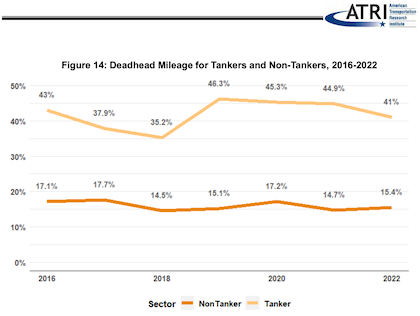
Bridging the Gap
April 2, 2024
Hydrogen Dreams
April 27, 2024The Cost of Delay
The numbers are eyebrow-raising:
- $94.6 billion: the cost of truck congestion in 2021, resulting in
- 1.27 billion hours of delays, which equals
- 460,000 truck drivers sitting idle for a year, resulting in
- 6.793 billion gallons of wasted fuel.

Waiting…
Those staggering statistics come from American Transportation Research Institute’s “Cost of Congestion to the Trucking Industry” 2023 update. As Freightwaves summarizes ATRI’s report:
“The study pointed out that when the overall congestion cost is distributed across the country’s registered tractor-trailers, the average annual cost per truck is $6,824 — equal to 3% of the average annual revenue generated per truck in the truckload sector in 2021, according to ATRI.”
Fingerpointing is often too easy. Blame it on a too-eager pandemic recovery, with demand outstripping supply. Or on bottlenecks at our ports. Or a depleted truck driver pool. Cumulatively, it’s all that, and more.
Don’t forget new construction and road and bridge repair. Those cause reroutings and delays, too.
Which brings us to the Deadhead Blues.
From ATRI’s 2023 Operational Cost of Trucking Report:
 “Deadhead or empty mileage – miles that do not generate revenue and are not covered by fuel surcharges – are a serious financial and productivity drain, especially when fuel prices are high. In 2022, 15.4 percent of non-tanker carriers’ mileage was deadhead mileage on average.”
“Deadhead or empty mileage – miles that do not generate revenue and are not covered by fuel surcharges – are a serious financial and productivity drain, especially when fuel prices are high. In 2022, 15.4 percent of non-tanker carriers’ mileage was deadhead mileage on average.”
So, 15.4 percent deadhead mileage for non-tanker carriers.
Tanker carriers? Those logged 41 percent empty. Think about delivering fuel from refinery to market. After they empty, you can’t exactly fill them back up with milk or cookies or TV sets. Those are largely by-necessity deadhead scenarios.
Other deadhead scenarios include, say, a carrier short-hopping a load and needing to drive elsewhere with no desire or time to pick up another load. Or there’s simply nothing available a reasonable distance away.
Does it get better? We’ll wait for updated statistics. In the meantime, thinking about and acting on ways to reduce deadhead losses is not idle speculation.
